July7
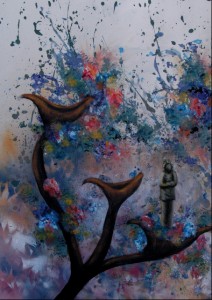 We all assume from our own normalities, our own perspectives and experiences, cultures, histories, orientations, personalities and identifications. And strangely, no matter how many times life kicks our butt, proving assumptions are so very fallible, there we are again, assuming. Read the rest of this entry »
We all assume from our own normalities, our own perspectives and experiences, cultures, histories, orientations, personalities and identifications. And strangely, no matter how many times life kicks our butt, proving assumptions are so very fallible, there we are again, assuming. Read the rest of this entry »
July7
 Have you ever been bored looking at perfectionist, somewhat predictable art which just fails to draw you in, fails to connect, fails to transport you anywhere? When I paint I want to create atmospheres I want to walk into, touch, even eat. I want dripping ice-cream colours, textures that make me feel I’ve touched them even though I’ve only seen them. And most of all Read the rest of this entry »
Have you ever been bored looking at perfectionist, somewhat predictable art which just fails to draw you in, fails to connect, fails to transport you anywhere? When I paint I want to create atmospheres I want to walk into, touch, even eat. I want dripping ice-cream colours, textures that make me feel I’ve touched them even though I’ve only seen them. And most of all Read the rest of this entry »
July7
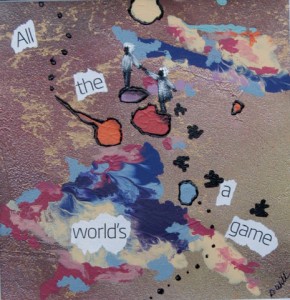 We so often take our lives so seriously, so personally. But how seriously or personally do we healthily want to take our lives? What might an Emo say? What might a sociopath say? Is the healthy stance somewhere between the two? Read the rest of this entry »
We so often take our lives so seriously, so personally. But how seriously or personally do we healthily want to take our lives? What might an Emo say? What might a sociopath say? Is the healthy stance somewhere between the two? Read the rest of this entry »
July7
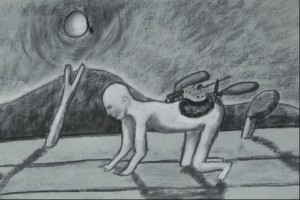 As an autism consultant with an encyclopedic mind for systems and lists of information I often found myself perceived as something of a walking textbook, a mine of information. Read the rest of this entry »
As an autism consultant with an encyclopedic mind for systems and lists of information I often found myself perceived as something of a walking textbook, a mine of information. Read the rest of this entry »
July1
 Barry Humphries is one of those faces that has haunted me for years. I have had to see his face on TV, in newspapers and magazines, on billboards and each time I remember him in our house, in my room, in the early 70s when I was a child. And the smile from the billboards never quite jells with the leer I remember. So reading about Barry Humphries’ Farewell Tour this June 2012, I felt, finally no remorse for the finale of an iconic Australian entertainer. Read the rest of this entry »
Barry Humphries is one of those faces that has haunted me for years. I have had to see his face on TV, in newspapers and magazines, on billboards and each time I remember him in our house, in my room, in the early 70s when I was a child. And the smile from the billboards never quite jells with the leer I remember. So reading about Barry Humphries’ Farewell Tour this June 2012, I felt, finally no remorse for the finale of an iconic Australian entertainer. Read the rest of this entry »
June14
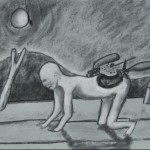 Who am I? I found this original amidst my own works. I don’t remember creating it and struggle to believe its my work. Is it a copy of a known work? Do you recognise it? Who is the artist? Read the rest of this entry »
Who am I? I found this original amidst my own works. I don’t remember creating it and struggle to believe its my work. Is it a copy of a known work? Do you recognise it? Who is the artist? Read the rest of this entry »
June7
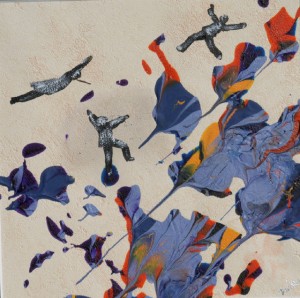 Dissociative Identity Disorder is on the same spectrum as Post Traumatic Stress Disorder (PTSD). They are both DISSOCIATIVE disorders. Those who develop DID have over developed abilities in dissociating, a skill very commonly overdeveloped in children with autism. Dissociation is a natural process in children under the age of 5 but most children grow out of it. Those with developmental disabilities may have stronger motivations to dissociate from what they find sensorily overwhelming or too hard to process and so those with autism may be predisposed to dissociation but also other dissociative processes, such as depersonalisation and derealisation. Some personality traits can also predispose some children to overdeveloping these dissociative processes. Read the rest of this entry »
Dissociative Identity Disorder is on the same spectrum as Post Traumatic Stress Disorder (PTSD). They are both DISSOCIATIVE disorders. Those who develop DID have over developed abilities in dissociating, a skill very commonly overdeveloped in children with autism. Dissociation is a natural process in children under the age of 5 but most children grow out of it. Those with developmental disabilities may have stronger motivations to dissociate from what they find sensorily overwhelming or too hard to process and so those with autism may be predisposed to dissociation but also other dissociative processes, such as depersonalisation and derealisation. Some personality traits can also predispose some children to overdeveloping these dissociative processes. Read the rest of this entry »
May16
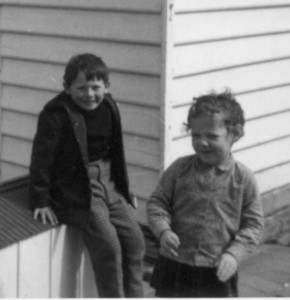 When my first book, Nobody Nowhere, became a major international bestseller, my Australian publisher, Doubleday received a submission from Chris Eipper for his fiction novel he was hoping to get a publisher for. His submission was rejected. I then received a letter from him via my UK publisher (I was now living in the UK) informing me that he was involving himself as a researcher in my case. I also received copies of letters he sent to each of my publishers and to the multitude of journalists who had interviewed me. I also heard from Autism Victoria that he had contacted them to try and discuss my diagnosis with them. Read the rest of this entry »
When my first book, Nobody Nowhere, became a major international bestseller, my Australian publisher, Doubleday received a submission from Chris Eipper for his fiction novel he was hoping to get a publisher for. His submission was rejected. I then received a letter from him via my UK publisher (I was now living in the UK) informing me that he was involving himself as a researcher in my case. I also received copies of letters he sent to each of my publishers and to the multitude of journalists who had interviewed me. I also heard from Autism Victoria that he had contacted them to try and discuss my diagnosis with them. Read the rest of this entry »
May16
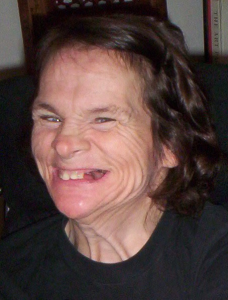 I remember one night when three of us, me, my husband Chris Samuel, and a friend of ours Kieran, went to dinner at Rosemary Crossley’s house. Rosemary and her partner, Chris B were always great hosts but for me, I felt most compatible with Anne. Anne was feisty, cheeky, star of the flooring one liner. She was an egalitarian, who wouldn’t be having been dumped since age three to spend up to the age of 18 in a Victorian style institution deemed severely retarded where she almost starved to death. It would make any of us rather political, if of course were were credited with the intelligence to be so. Read the rest of this entry »
I remember one night when three of us, me, my husband Chris Samuel, and a friend of ours Kieran, went to dinner at Rosemary Crossley’s house. Rosemary and her partner, Chris B were always great hosts but for me, I felt most compatible with Anne. Anne was feisty, cheeky, star of the flooring one liner. She was an egalitarian, who wouldn’t be having been dumped since age three to spend up to the age of 18 in a Victorian style institution deemed severely retarded where she almost starved to death. It would make any of us rather political, if of course were were credited with the intelligence to be so. Read the rest of this entry »
May9
 When my first book, Nobody Nowhere, became a major international bestseller, my Australian publisher, Doubleday received a submission from Chris Eipper for his fiction novel he was hoping to get a publisher for. His submission was rejected. I then received a letter from him via my UK publisher (I was now living in the UK) informing me that he was involving himself as a researcher in my case. I also received copies of letters he sent to each of my publishers and to the multitude of journalists who had interviewed me. I also heard from Autism Victoria that he had contacted them to try and discuss my diagnosis with them. Read the rest of this entry »
When my first book, Nobody Nowhere, became a major international bestseller, my Australian publisher, Doubleday received a submission from Chris Eipper for his fiction novel he was hoping to get a publisher for. His submission was rejected. I then received a letter from him via my UK publisher (I was now living in the UK) informing me that he was involving himself as a researcher in my case. I also received copies of letters he sent to each of my publishers and to the multitude of journalists who had interviewed me. I also heard from Autism Victoria that he had contacted them to try and discuss my diagnosis with them. Read the rest of this entry »
 We all assume from our own normalities, our own perspectives and experiences, cultures, histories, orientations, personalities and identifications. And strangely, no matter how many times life kicks our butt, proving assumptions are so very fallible, there we are again, assuming. Read the rest of this entry »
We all assume from our own normalities, our own perspectives and experiences, cultures, histories, orientations, personalities and identifications. And strangely, no matter how many times life kicks our butt, proving assumptions are so very fallible, there we are again, assuming. Read the rest of this entry »







